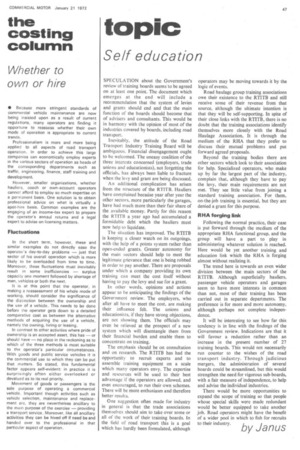the costing column
Page 49

If you've noticed an error in this article please click here to report it so we can fix it.
Whether to own or hire
• Because more stringent standards of commercial vehicle maintenance are now being insisted upon as a result of current regulations, many operators are finding it opportune to reassess whether their own mode of operation is appropriate to current trends.
Professionalism is more and more being applied to all aspects of road transport operation. In order to achieve this large companies can economically employ experts in the various sectors of operation as heads of the corresponding departments such as traffic, engineering, finance, staff training and development.
However, smaller organizations, whether hauliers, coach or own-account operators cannot afford to employ so much expertise on a permanent basis. One solution is to obtain professional advice on what is virtually a spot-hire basis. Common examples are the engaging of an income-tax expert to prepare the operator's annaul returns and a legal expert to advise on licensing matters.
Fluctuations
In the short term, however, these and similar examples do not directly ease the operator's day-to-day problems — just that sector of his overall operation which is more likely to be overloaded from time to time. Moreover, these fluctuations must inevitably result in some inefficiencies — surplus capacity one moment followed by shortage of men, vehicles or both the next.
It is at this point that the operator, in making a reassessment of his whole mode of working, should consider the significance of the distinction between the ownership and the use of a vehicle. This needs to be done before the operator gets down to a detailed comparative cost as between the alternative methods of acquiring the use of a vehicle, namely the owning, hiring or leasing.
In contrast to other activities where pride of ownership is an accepted asset, this has — or should have — no place in the reckoning as to which of the three methods is most suitable to the operator's particular circumstances. With goods and public service vehicles it is the commercial use to which they can be put that matters. So stated, this fundamental factor appears self-evident: in practice it is surprisingly often either overlooked or devalued as to its real priority.
Movement of goods or passengers is the sole purpose of operating a commercial vehicle. Important though activities such as vehicle selection, maintenance and replacement are, they are nevertheless ancillary to the main purpose of the exercise — Providing a transport service. Moreover, like all ancillary activities they can be hived off if need be and handed over to the professional in that particular aspect of operation.










































































































